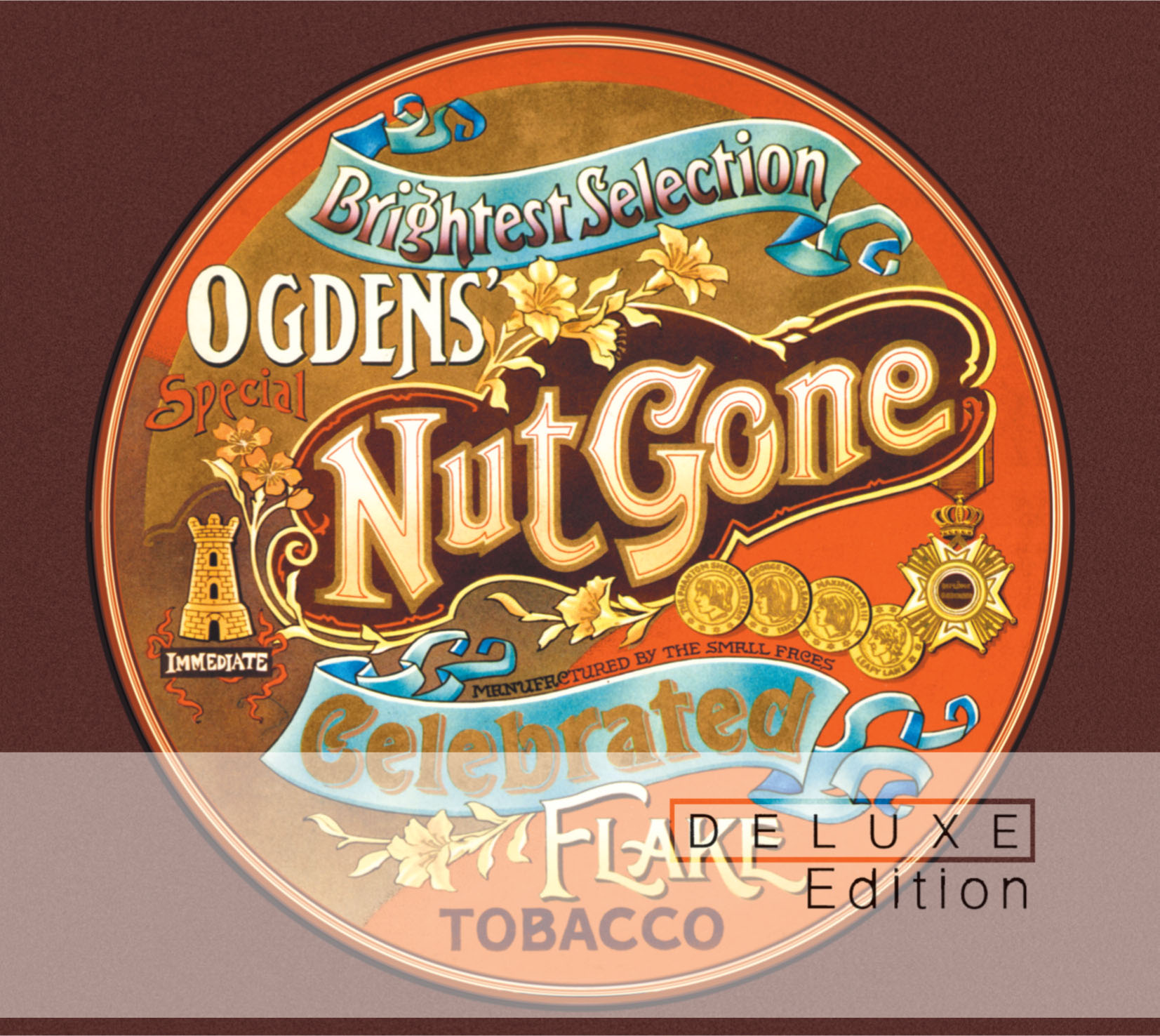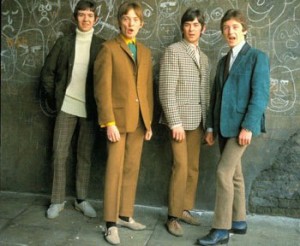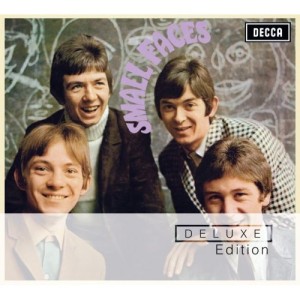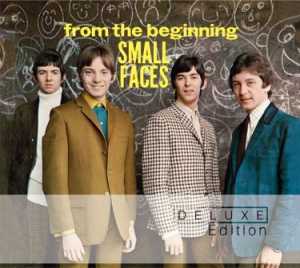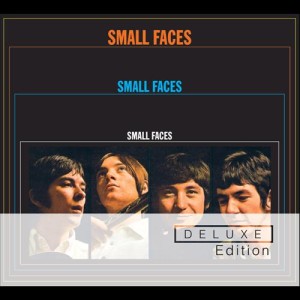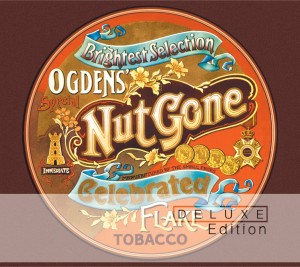Small Faces (Decca), released 6th May 1966
From The Beginning (Decca), released 2nd June 1967
Small Faces (Immediate), released 23rd June 1967
Ogdens’ Nut Gone Flake (Immediate), released 24th May 1968
Maybe it’s a generational thing, but for me the fleeting impersonal nature of mp3s seems…well, rather soulless and carefree. Much better to hold a tenable hard copy in your hands, than to download a evanescent file. I’ve always had, a sometimes irrational, fetish for vinyl, and felt rather snobbish towards CDs. Yet, just as the CD’s demise and obituary is hovering on the cusp of being written – news of its death are greatly exaggerated – artists and labels seem to be upping their game with the format; especially when reprising material from the last five-decades. Universal are intent for one, on repackaging and releasing their archival treasure-chest once more – one of the last entertainment conglomerates left in a decreasing shark-pool of record labels – as they buy-up the rights to umpteen bands and artists back catalogs. The latest band to receive Universal’s – through Sanctuary – orotund (welcomed on this occasion I might add), indulged and lavish treatment is the Small Faces. Their quartet of Memphis-stewed Stax rave-ups; maximum R&B (borrowed from The Who); blue-eyed soul and hearty ‘Village Green’ psych, LP’s is handled with kid-gloves and given a similar make-over to last years Kinks retrospective.
Each album is packaged in a 2-disc, attractively furnished, editions (apart from Ogdens’ Nut Gone Flake, which is a 3-disc set); complimented by Mark Paytress’ informative and engaging survey of the band’s story – from the East End urchin’s founding in 1965 to their eventual break-up in 1968. With the full backing of the surviving members, Kenny Jones (drums) and Ian ‘Mac’ Mclagen (Keys), whose anecdotes and observations spice things up and prove insightful, there is a countless track list of alternate mixes, backing and sessions for completists – this should really be the last word on the Small Faces legacy, though I won’t hold my breath!
Beginning with their untamed 1966 Small Faces debut, we can hear the original 12-track album in all its mono recorded glory – a method which used only 2-tracks, one for the backing and the second for vocals. The energy caught on this record was often down to the no-nonsense, swift recording process that left scant room for mistakes or multiple takes and shows what a live force these boys must have been, as they hot-footed it straight from the stage and into the studio. A mix of both R&B covers, shimmy soul and brash beat group numbers, the self-titled LP captured the excitement of that pinnacle year. The proto-Mod, pill-popping fueled material on offer ran through riotous – ‘Pimlico’ via the Mississippi delta – versions of classics, such as Sam Cooke‘s Shake, and spangly pop nuggets, like Sha-La-La-La-Lee. Tentative steps towards writing their own material were at first patchy, though the hollering Steve Marriott vocal-led, Come On Children, lifts the rafters and the self-explanatory, chugging paean, E Too D, features some stirring Marriott pain: “Sometimes I feel like a frustrated child!”
As with all the four albums, Small Faces concatenates together the relevant singles and their B-sides. These range from the tormented rasping cover of Timi Yuro‘s What A Matter Baby, to the , often forgotten A-side, burgeoning psych plodder, Patterns. Disc 2 is a mix of alternative mono and electronically processed stereo versions, which vary only slightly from their originals: though obviously stereo will have an effect on the quality and mix, in this case producing a more suffused and cleaner-cut sound on some of the featured tracks.
As the ferocious R&B sound began to wear-off and the acid replaced the uppers and weed, the Small Faces grew weary and tired of their perceived pop image. Leaned-on by their prototype hardman, gangster-styled manager, Don Arden to score hit after hit record for the teeny-boppers, the group’s feet never touched the ground during a year of non-stop performances and recording schedules. Encouraged to indulge in their ‘Carnaby Street’ wardrobes, and to just keep on accepting the seemingly free-ride merry-go-round of ‘birds and booze’, it suddenly dawned on them that they were in fact paying for all these treats, and lining the pockets of their intimidating manager. Wishing to jump ship as 1966 crept into 67, Marriott and his chums would seek greener and more artistically credible pastures. They found a new home on Andrew ‘Loog’ Oldham’s own imprint, Immediate (home to P.P Arnold and The Nice), making the leap after ousting Arden at Decca. As a parting shot, Arden rushed-out the ramshackle misshaped, loose recordings, retrospective, From The Beginning; releasing it weeks before the groups inaugural debut LP for Immediate.
The 14-track sprawl is again in mono, complimented by an abundance of bonus material, which includes backing track instrumentals and varied takes of tracks such as Hey Girl, Take This Hurt Off Me, and Smoky Robinson‘s, Baby Don’t You Do It; a track that features the Small Faces original keyboardist, Jimmy Watson on lead vocals (Watson was replaced early on by Ian ‘Mac’ Mclagan, after being asked to leave; a battle of egos made it impossible for him and Marriott to continue working together). Booker T & The M.G.’s, Marvin Gaye, Del Shannon and Don Convoy are all covered, whilst hints of John’s Children and The Creation also fizzle through into the Small Faces sound; a sound which dragged the band back into a period that they wished to move away from for new horizons. Condemned by the band themselves – especially as it included unfinished studio work – they were nevertheless powerless to stop it, as Arden’s contract tied the group up in all kinds of obligations and duties. From The Beginning is nonetheless an intriguing record that features some essential performances, and once again demonstrates those soulful roots.
That first Immediate release – often referred to as the Small Faces 67 LP – moves into the psychedelic haze of 1967; the hair from under Marriott’s felt, floppy hat, now creeping over his paisley shirt collar, a sign of the changing times. Wholly made-up of original material, the 14-song set is an indication of the bands move away from their earlier influences (though the soul, never truly went away, so integral to Mariott’s sublime vocals as it was); Marriott now looking to create a sophisticated, grown-up experience for the listener, as he and Ronnie Lane began to get involved with the production itself, eager as they were to push the envelope further. It was also an opportunity for, the much-missed, bass player, co-founder, and composer, to share lead vocal duties with Marriott on this medley of pastoral psychedelic soul. This was indeed a leap forward creatively, as they explored and adopted an ever-growing collection of exotic sounds, including the Japanese Koto and a brass section. You only need to look at the accompanying singles, Here Comes The Nice, Itchycoo Park, and the originally written for, P.P Arnold backed, Wurlitzer driven classic, Tin Soldier, to realize how far the quartet had progressed.
Unfortunately the release date was put back six months and what should have been an album more in-tune and contemporary with the Rolling Stones‘ Between The Buttons and the The Who‘s A Quick One, now came out in the same month as The Beatles‘ game-changing, Sgt.Pepper; somewhat raining on the Small Faces parade and obscuring what should have been a crowning moment for the band.
Thanks to this repackaging exercise, connoisseurs and fans can debate to their hearts content, the ‘ins and outs’ of mono vs stereo as both versions are included here, alongside the addition of the stonking, power-house, soul-shaking, Don’t Burst My Bubble – perhaps one of the bands most under-appreciated and forgotten gems.
The Small Faces most lasting and accomplished master-stroke, Ogdens’ Nut Gone Flake, propelled the group into the status of legends. Inspired by Pete Townshend’s vision for what would be The Who’s conceptual opus, Tommy, Marriott and his cohorts weaved their very own rich-tapestry of Victoriana, music hall, psychedelia, Elizabethan charm, nonsensical prose and acid -folk into a concept-bound musical suite; one that remains as quintessentially English and rustic as cottage pie. Imbued with elements of the 5th Dimension, Pink Floyd, Soft Machine and The Nice, the Small Faces floated on an LSD laden flying-carpet, over the calico wall, and into 1968.
An album of two-acts, the first is a harmonious collection of ethereal, metaphorical tales about ‘bakers’ and a ‘dockers delight’ that sways between the staggering halcyon-washed and lamented love plaint, Afterglow, and ‘OTT mockney’, Lazy Sunday – Marriott using his previous showmanship East end credentials as the Artful Dodger on the Lionel Bart written, Oliver! soundtrack, to full effect. The second part is a loosely concocted, Lewis Carrol-esque styled surreal tale of Happiness Stan and his fatuous search for the missing halve of the moon – it must be pointed out at this stage that the group spent more time and effort on the venerated and popular, mock-tobacco parodied, cover art than on the actual story. Stanley Unwin‘s (Spike Milligan passed on the original offer to narrate) gibberish, mixed-up etymological, links act as a pliable thread between, and as part of, the six-track suite of acid-grooves and heavier rock – that at times boarders on prog-rock. Broadening their sound, the Small Faces began to morph into a truly adventurous act: just have a listen of the Jimi Hendrix homage to Foxy Lady, Rollin Over, or absorb the kaleidoscope, phased tones of The Journey to gauge the variety and depth of the Small Faces confident ascetic.
No longer as patchy in quality – the original album suffered from fluctuating degrees of this – the deluxe edition features the usual mono vs stereo additions, as well as many alternative studio takes (including studio banter), and special mix-downs, produced for the US market (one which they failed to dent). Though this album spreads to three-discs, there isn’t all that much extra on offer; the content varying in recording processes, but not enough to mark-out any new revelatory information.
Almost impossible to recreate on the road, Ogdens’ Nut Gone Flake soon became the bands final hurrah, as tensions mounted between Marriott and the rest of the group. Pushing for a heavy and more complex sound Marriott’s frustrations boiled over (he demanded before he left that Peter Frampton, who was a member of the majestic psych-poppers, The Herd, should join the band as a second guitarist, and potential co-frontman). It’s rather telling that Marriott quit live on stage, and hurtled straight into the harder, progressive, Humble Pie, without drawing breath; as if his getaway car was always waiting with the engine running just out of sight, if he didn’t get his way. Failing to mirror the success and artistic inventive highs of their contemporaries, The Kinks, The Beatles, The Who and Rolling Stones, they never quite shook off the shackles of being a singles band, and never saw-out their potential. When they did finally achieve the goal of recording a thoughtful and complicated conceptual work-of-art, the group imploded. As Rock’n’Roll legend concludes, Ronnie ‘Plonk’ Lane, Kenny Jones and ‘Mac’ went on to form the Faces with Rod Stewart; occasionally resorting to the odd reprise (in the mid-70s Marriott and the others began rehearsing for a new tour and material, though Lane was sadly showing the early symptoms of MS; misconstrued by the band, who didn’t know he had the condition, as drunken and contrary behavior Lane ended up quitting). Two albums, Playmates (1977) and 78 In The Shade (1978), couldn’t relight the old magic; released as they were at the height of punk. Steve Marriott would pass away in 1991 and Ronnie, six years later, leaving Jones and ‘Mac’ the sole guardians of the Small Faces legacy.
The deluxe set is a difficult proposition, in that it chronicles the full story, warts-and-all, through interviews and countless memorabilia, putting each LP and song in its historical context and surroundings, enveloped in a sumptuous package; yet it fails to offer anything refreshing or new to the connoisseur and collector – there’s hardly any tracks included that haven’t seen the light of day in one way or another. Instead, if you find yourself needing a handy overview and survey of the band, or are missing certain tracks, then this is a definitive enough addition to the collection; especially if the price is right.
07/05/2012
[Rating:4]

